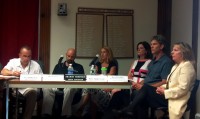DPW Pros, Cons Discussed

It was a four-hour marathon meeting in which members of former Yorktown administrations talked about how the town’s operations might improve, while its current administration discussed how much better they are now than they previously had been.
The special meeting of the Town Board was held on the night of July 25, in a council chambers packed with interested residents and a dais similarly bursting at the seams with elected and appointed town officials. Attendance in the public’s portion of the room dwindled as the hours progressed, but those seated in the front, many of whom were concerned for their jobs, stayed to the bitter end.
During its presentation, Citizens For a Yorktown DPW covered some well-traveled ground in its quest for a voter referendum to eliminate the elected position of highway supervisor in favor of an appointed Department of Public Works director. Under the proposal (first presented to the board in mid-May), several of the town’s existing departments would be consolidated under the new DPW umbrella, eliminating what the pro-DPW group sees as redundancies and inefficiencies in Yorktown’s current operation.
The group has continued to argue that an appointed DPW director would be much more accountable to the town supervisor and board. Under the current system, while the administration controls how much money the highway supervisor can spend on projects, the person who holds that office is mainly held accountable every four years at the polls.
The group’s presentation was led by former town supervisors Aaron Bock and Susan Siegel, and Jane Daniels, a leading force in developing Yorktown’s extensive trail system. Its newest addition to its information arsenal was a document called “Framework for the Future: A DPW For Yorktown.” Having previously touted a first-year savings of $250,000 with the switch to a DPW, the group spelled out more specifically in this document where those savings might be realized. Two contrasting flow charts – one of the town’s existing structure, and the other a potentially new configuration – showed a proposal for streamlining that would adversely affect the employment status of most every department head in attendance.
Seated at a table added to the dais at the right of the traditional board table were Highway Superintendent Eric DiBartolo; Parks and Recreation Superintendent Brian Gray; Town Engineer Sharon Robinson; Water Distribution Superintendent Brian Rambo; and Kim Angliss Gage, who serves as the head of the Department of Environmental Conservation, recycling coordinator, and director of the town’s Central Garage. All but DiBartolo and Rambo said they would stand to lose under the proposed restructuring. DiBartolo maintained that he will not seek reelection when his term expires next year. Rambo said it seemed he would likely become the new assistant DPW superintendent under the potential reconfiguration.
After Bock, Siegel and Daniels handled their respective portions of the group’s presentation, Councilman Nick Bianco said: “That’s it?”
The meeting was then opened to the public. Several of the residents who spoke were pro-DPW; a few others were at least pro-referendum; and still others said they preferred the status quo.
The latter third of the meeting, by which the audience had thinned to about a quarter of its largest size, served as a primer for how the Town of Yorktown is run on a day-to-day basis. It featured detailed presentations by each of the appointed department heads about their individual and shared responsibilities, how their departments work together, and what the consolidation of their departments into a new DPW would mean to them and the town.
For example, Gray described how he oversees a complex system of daily baseball field maintenance from April until October.
“On an average week, Monday through Friday, we’re doing 8 to 14 fields a day, [and] Saturday and Sunday from 12 to 17 fields,” said Gray. “This schedule changes on a daily basis.”
Gray said that from time to time, his department will receive a call from coach on a Friday night at 10 o’clock that will require a change in plans as to which fields will need work before the next day’s games. The crews scheduled to work on those fields will have to be notified at 5 or 6 a.m. the next day of the change in plans.
He questioned whether a new DPW chief, who would assume the direction of field maintenance, would be as willing take such a late-night phone call and redirect his workers as needed to facilitate the change. “I personally don’t think it’s going to happen,” said Gray.
The DPW group again pressed the board to advertise for a public hearing on the issue in August, claiming that the local law required to place the issue up for referendum would have to be adopted by Sept. 1. Last week, a spokesperson for the Westchester County Board of Elections said that the agency’s deadline for placing a referendum on the ballot is Oct. 1.
The Yorktown Town Board’s next scheduled meeting is a work session on Tuesday, Aug 7 at 6 p.m. The meeting location, weather permitting, will be Downing Park on Route 202 in Yorktown.

Adam has worked in the local news industry for the past two decades in Westchester County and the broader Hudson Valley. Read more from Adam’s author bio here.
